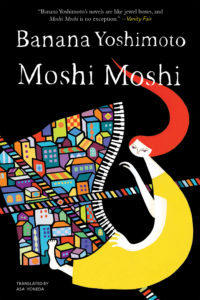I can sense the border between when time dribbles on and stretches
 Moshi Moshi
Moshi Moshi
by Banana Yoshimoto
translated from Japanese by Asa Yoneda
This is an odd book. I loved some things about it, but I didn’t love it. Which is a shame as it sounded so thoroughly up my alley.
Yoshie is in her early 20s when her semi-famous musician father dies in bizarre circumstances. Finding the family home overwhelming in her grief, she moves to the small, hip neighbourhood Shimokitazawa. She loves her quirky, arty new locale and her new job at a cafe there. But just as she is settling in, her mother shows up and insists on moving in with her.
Yoshie is having nightmares about her father, while her mother claims that their family home is haunted by him. The dead father is a constant presence through the book, necessarily so, as the whole arc of the story is the mother and daughter’s shared grief. (The significance of the title is that “Moshi moshi” is how you answer the phone in Japanese, and one of the plot threads is about the father’s mobile phone.)
The depiction of Shimokitazawa is wonderful – it really came alive for me and made me want to go there. There is an element of middle-class folk from a fancy neighbourhood playing at being poor and romanticising “the simple life”, but there is also something very enticing in Yoshimoto’s descriptions of the local shops and restaurants.
“First, I stop by One Love on Pure Road, just over there, and browse the old books – I can never quite tell what’s for sale and what’s the owner Hacchan’s personal collection – and chat to Hacchan a little…After that, I go to the traditional tea house and say hi to Eri-chan the manager and the pet tortoises, and order the Japanese tea of the day along with some rice crackers or sweet dumplings…I can sense the border between when time dribbles on and stretches, like a warm rice cake, and when it suddenly pulls in tight, and speeds up again.”
However, for the most part this is not a well-written book. It’s very dialogue-heavy and the dialogue is super clunky. It’s awkward and expository, not at all how people actually talk. The dialogue is used to tell rather than show and I cringed often. It’s difficult to know how much of this is a problem with translation, but at most that could only be a small part, as I really felt a lot of the conversations as a whole were out of place. In general I liked the translation, which didn’t over-explain daily life in Japan or try to translate Japanese honorifics (something the subtitles of Japanese and Korean TV shows often do, which really bugs me, because the names that characters use for each other can be really important).
“The things I believed in were puny and insignificant in the face of power like this – that was why Dad had died. And the world was full of dark forces like that. In the terrifyingly vast entirety of existence, which contained everything conceivable, there seemed to be no use in me trying to speak up and say anything at all. Even if deep down I was connected to the whole of it, any thought that I could contain in my head was bound to be ineffectual and pointless.”
The other cringeworthy aspect of the book is the romance element. Yoshie is young and figuring out who she is and what she wants from life. I didn’t need (or want) her to end the book with either of the romantic partners set up for her. I can’t go into exactly what bothered me without spoilers, but I found it very uncomfortable.
It’s a shame, because the atmosphere, scene setting and main plot are all good. And so many people seem to love Banana Yoshimoto. But then she wouldn’t be the first popular author I have discovered I don’t like!
Japanese edition published 2010 as a serial in The Mainichi Newspapers.
This translation published 2016 by Counterpoint.
Source: Christmas present from my Dad.